Related Research Articles

Lamont Herbert Dozier was an American singer, songwriter, and record producer from Detroit, Michigan. He co-wrote and produced 14 US Billboard number-one hits and four number ones in the UK.
The Elgins were an American vocal group on the Motown label, active from the late 1950s to 1967. Their most successful record was "Heaven Must Have Sent You", written and produced by the Holland–Dozier–Holland team, which was a hit in the US in 1966, and in the UK when reissued in 1971.
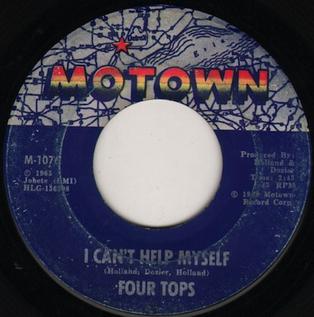
"I Can't Help Myself (Sugar Pie Honey Bunch)" is a 1965 hit song recorded by the Four Tops for the Motown label.

"Baby I Need Your Loving" is a 1964 hit single recorded by the Four Tops for the Motown label. Written and produced by Motown's main production team Holland–Dozier–Holland, the song was the group's first Motown single and their first pop Top 20 hit, making it to number 11 on the US Billboard Hot 100 and number four in Canada in the fall of 1964. It was also their first million-selling hit single.
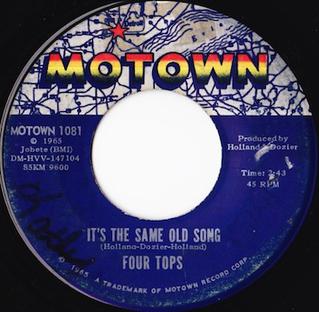
"It's the Same Old Song" was recorded by the Four Tops for the Motown label. It was released in 1965 as the second single from their second album. Written and produced by Motown's main production team Holland–Dozier–Holland, the song is today one of The Tops' signatures, and was reportedly created—from initial concept to commercial release—in 24 hours. It reached #5 on the Billboard Hot 100 and #2 on the Billboard R&B chart. It also reached #34 in the UK.

"Bernadette" is a 1967 hit song recorded by the Four Tops for the Motown label. The song was written and composed by Holland–Dozier–Holland, Motown's main songwriting team, and produced by Brian Holland and Lamont Dozier.

Richard Dean Taylor was a Canadian musician, most notable as a singer, songwriter, and record producer for Motown during the 1960s and 1970s. According to Jason Ankeny, Taylor was "one of the most underrated acts ever to record under the Motown aegis."
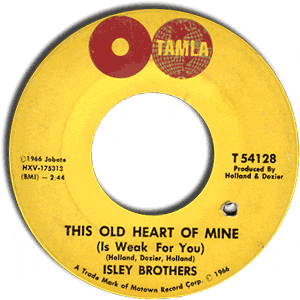
"This Old Heart of Mine (Is Weak for You)" is a Holland–Dozier–Holland song that was a hit for American musical group the Isley Brothers in January 1966 during their brief tenure on Motown's Tamla label. Featuring Ronald Isley on lead vocal, "This Old Heart of Mine" peaked at number twelve on the Billboard Hot 100, and at number six on the Billboard R&B Singles chart.

"Nowhere to Run" is a 1965 pop single by Martha and the Vandellas for the Gordy (Motown) label and is one of the group's signature songs. The song, written and produced by Motown's main production team of Holland–Dozier–Holland, depicts the story of a woman trapped in a bad relationship with a man she cannot help but love.
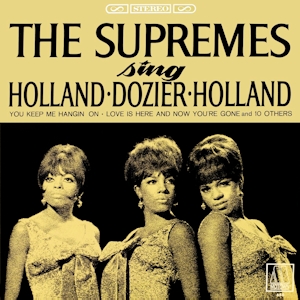
The Supremes Sing Holland–Dozier–Holland is the tenth studio album released by The Supremes for Motown in 1967. It includes the number-one hit singles "You Keep Me Hangin' On" and "Love Is Here and Now You're Gone". As the title states: all songs on the album were written and produced by Motown's main songwriting team of Holland–Dozier–Holland. Most of the album was recorded during the spring and summer of 1966; however several songs date back to the summer of 1964.
"Come and Get These Memories" is an R&B song by Motown girl group Martha and the Vandellas. Their second single released under Motown's Gordy Records subsidiary, "Memories" became the group's first hit single, reaching number 29 on the Billboard Pop Singles Chart, and number-six on the Billboard R&B Singles Chart.

Reach Out is the fourth studio album by the Four Tops, issued on Motown Records in July 1967. The group's biggest-selling studio album, Reach Out includes six of the Four Tops' most successful singles including the US and UK #1 hit "Reach Out I'll Be There", "Standing in the Shadows of Love", "Bernadette" and "7-Rooms of Gloom". The album was the group's last with the songwriting team of Holland–Dozier–Holland and also features covers of contemporary pop hits selected by Berry Gordy, among them Tim Hardin's "If I Were a Carpenter", the Left Banke's "Walk Away Renée" and two songs originally recorded by the Monkees. The album reached number 11 on Billboard Top LPs chart and peaked at number 4 in the United Kingdom, where it was released in November after delays. In 2020, Reach Out was ranked number 429 in Rolling Stone magazine's "The 500 Greatest Albums of All Time" list.
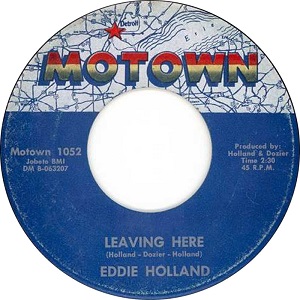
"Leaving Here" is a song written in 1963 by Motown songwriters Holland–Dozier–Holland. Written at the beginning of the partnership, it is notable in several recordings. It was originally released as a single in December 1963 by H-D-H lyricist Eddie Holland and peaked at number 76 on the Billboard Hot 100 and at number 27 on the Billboard R&B chart.
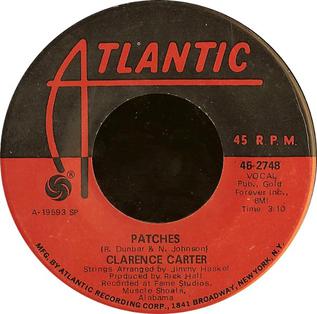
"Patches" (sometimes known as "Patches (I'm Depending On You)") is a country soul song written by General Johnson and Ron Dunbar and best known as the 1970 hit version by Clarence Carter. It won the 1971 Grammy Award for Best Rhythm & Blues Song.

"When the Lovelight Starts Shining Through His Eyes" is a song written by Holland–Dozier–Holland and recorded in 1963 by Motown singing group The Supremes. It is notable as the Supremes' first Billboard Hot 100 Top 40 recording, following seven previous singles between January 1961 and September 1963 which failed to enter the Top 40. The single is also notable as the first Supremes single written and produced by Holland–Dozier–Holland, who had previously created hits for Martha and the Vandellas and Mary Wells.
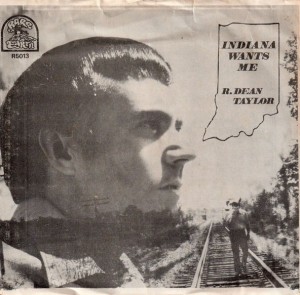
"Indiana Wants Me" is a song written, composed, and originally recorded by Canadian singer-songwriter R. Dean Taylor. It was released on the Rare Earth label, a subsidiary of Motown Records, in 1970, and was a top ten hit in both the US and UK. In Cashbox magazine, the single hit #1. The song spent two weeks at #2 in Canada.

"Heaven Must Have Sent You" is a song written by Brian Holland, Lamont Dozier, and Eddie Holland when at Motown, and first recorded by The Elgins in 1966. It was also a 1979 disco hit single by Bonnie Pointer.
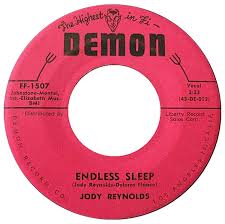
"Endless Sleep" is a "teenage tragedy" pop song written and originally recorded by rockabilly singer Jody Reynolds in 1957.

"Gotta See Jane" is a song and single by Canadian singer-songwriter R. Dean Taylor written by Taylor, Eddie Holland of Holland-Dozier-Holland, and Motown songwriter Ronald Miller.
References
- ↑ "45 Discography for V.I.P. Records". Globaldogproductions.info. Retrieved 2015-10-11.
- ↑ "R Dean Taylor". 45cat.com. Retrieved October 7, 2011.
- ↑ Betts, Graham (2004). Complete UK Hit Singles 1952-2004 (1st ed.). London: Collins. p. 773. ISBN 0-00-717931-6.
- ↑ "Original versions of There's a Ghost in My House by B.E.F. featuring Paul Jones". SecondHandSongs. Retrieved 2015-10-11.
- ↑ Strong, Martin C. (2003) The Great Indie Discography, Canongate Books, ISBN 1-84195-335-0, p. 42
- ↑ Betts, Graham (2004). Complete UK Hit Singles 1952-2004 (1st ed.). London: Collins. p. 271. ISBN 0-00-717931-6.
- ↑ Ned Raggett. "There's a Ghost in My House - The Fall | Song Info". AllMusic . Retrieved 2015-10-11.
- ↑ "There's a Ghost in My House - Graham Parker | Song Info". AllMusic. 1999-01-20. Retrieved 2015-10-11.
- ↑ "R. Dean Taylor – There's a Ghost in My House" (in Dutch). Single Top 100.
- ↑ "R. Dean Taylor: Artist Chart History". Official Charts Company.